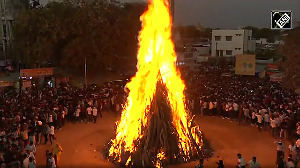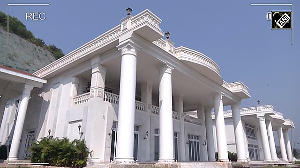Two experts of Indian and Pakistani origin respectively are revealed as playing a key role on opposite sides of the fence in the so-called 'dodgy dossier' claim that Britain exaggerated the threat from Iraq's alleged weapons of mass destruction.
It was established earlier this year that much of the published material compiled by the British government to win public support for the war against Saddam Hussein was lifted unattributed from a 10-year-old Ph D thesis published on the Internet.
As the scandal unfolded, British Prime Minister Tony Blair's Press Adviser Alastair Campbell's involvement in 'sexing up' the assertion that Iraq could launch chemical and biological weapons within 45 minutes came under scrutiny.
His role in the affair is under investigation by the House of Commons Foreign Affairs Committee.
It now transpires that the man in charge of Blair's propaganda unit that produced the anti-Iraq material is a career diplomat of Pakistani origin.
Asif Anwar Ahmad was director of the Coalition Information Centre - known as CIC - that was formed earlier this year by Campbell to formulate the case for overthrowing Saddam Hussein.
Last January, Ahmad told the Australian media his job for the CIC was to dispel myths in the Arab world about September 11 and put the pressure on Iraq to disarm.
Ahmad was quoted as saying, "It is amazing how often you hear the conspiracy theories: that September 11 was the work of Mossad (Israel's secret service) or the Central Intelligence Agency; that the war against terror is a Western invention to find an enemy to replace the Soviet bloc after the Cold War and it is not just ill-educated people who you hear this from. It is educated people."
The Mail on Sunday newspaper, which uncovered Ahmad's role, revealed how he left the CIC and returned to his full time job as a Commonwealth governments specialist soon after the dubious elements of the Iraq dossier were exposed.
A spokesman for the British Foreign Office commented, "It is ridiculous to suggest Ahmad's departure from the CIC was anything to do with the dossier. It was always envisaged he would move at that time. He is now doing an extremely important job organising this year's Commonwealth Heads of Government Meet (in Nigeria)."
On the other side of the dossier divide is a Cambridge University lecturer who was the first to realise that much of the British government's stated case for going to war was based on information taken from work done by an Oxford doctoral student, Ibrahim al-Marashi, and an article in the Jane's Intelligence Review.
Dr Glen Rangwala, who teaches at Newnham College, Cambridge is from Mumbai and of Bohra parentage.
He is credited with single handedly undermining the British government's case for waging a war against Iraq.
The 28-year-old lecturer, who learnt Arabic as a child, has helped to highlight evidence that most of Iraq's chemical and biological weapons - with the exception of mustard gas - could not have been successfully preserved since the end of the first Gulf War in 1991.
Rangwala's research effectively contradicts the basis of the British government's claim that Saddam Hussein's Iraq posed a threat to the national interest of the United Kingdom.
Widely quoted and highly respected, Rangwala told rediff.com his findings had been more trouble than they were worth.
He is looking forward to his long summer vacation, but the media is expected to turn to him again if the Iraq controversy refuses to die down.






 © 2025
© 2025